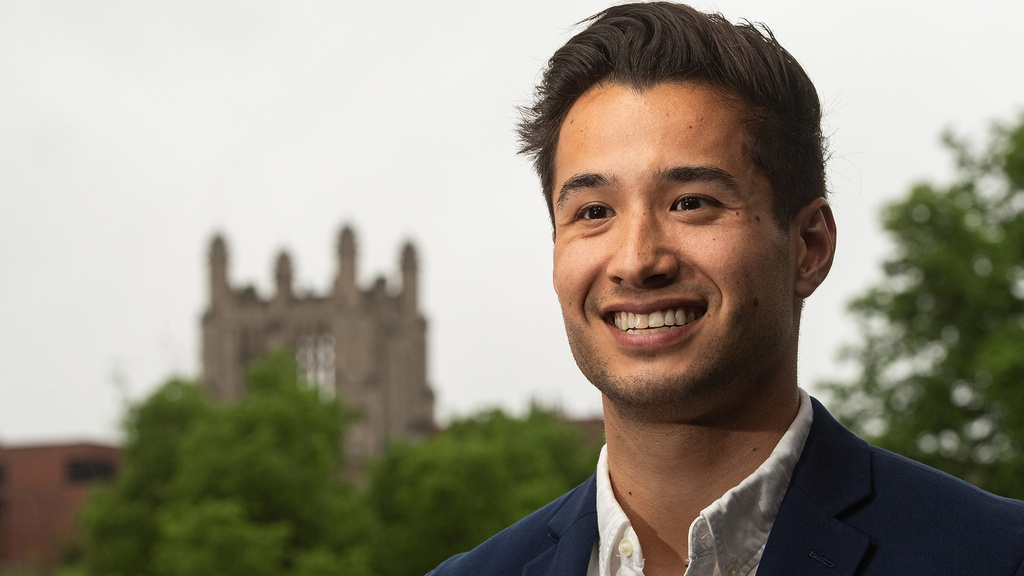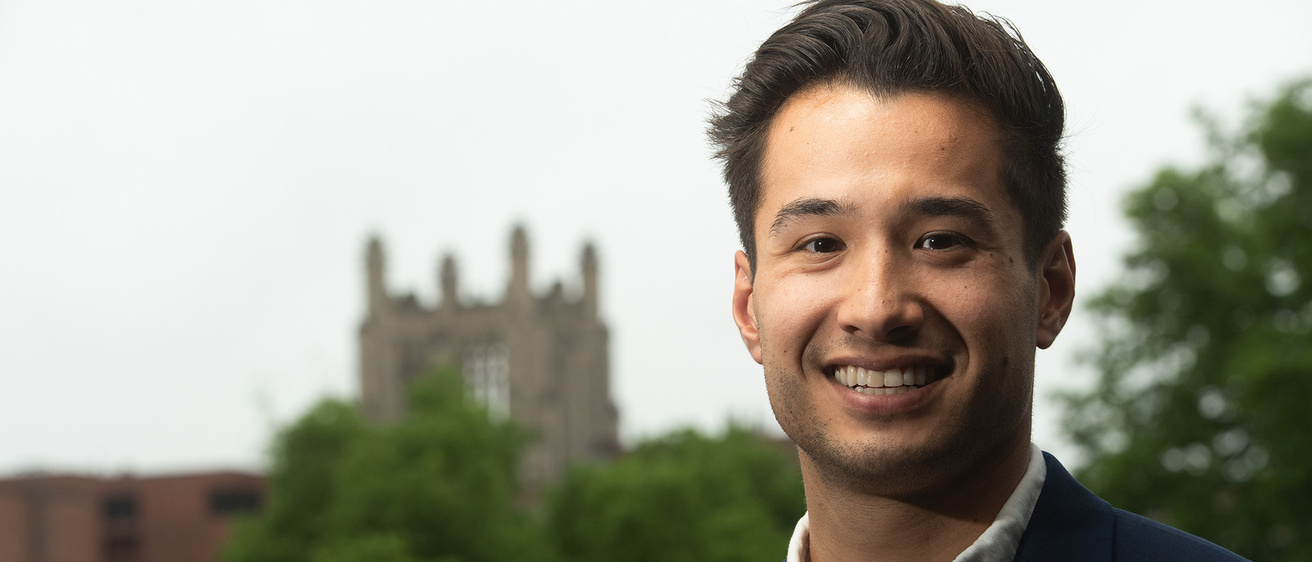Jon Lensing always knew he wanted to pursue a career in medicine. But deep into his medical-school path, he focused on launching a business — one he and his co-founders designed to meet a need in the medical industry — and soon saw its numbers skyrocket.
Story: Alison McGaughey
Photography: Tim Schoon
Published: June 11, 2020
Jon Lensing graduated from Iowa’s Carver College of Medicine in 2020 and can now technically be called “doctor.” But this spring, while he and his classmates were finishing medical school, Lensing made the difficult decision to pause his residency plans and instead pursue efforts to get an innovative business idea off the ground.
Lensing is one of three co-founders of Apollo, a web-based platform that helps health care providers transfer more easily between hospital systems, allowing them to fill gaps where coverage is needed. Launched in January 2020, the Coralville, Iowa-based business was already meeting a need in the regional medical community in its first few months of existence. When the coronavirus spread throughout the U.S., it led to an even greater need for physicians to respond to staffing shortages. Over the course of eight weeks, Apollo grew from facilitating partnerships between four hospitals and 80 physicians to 25 hospitals and more than 700 providers.
“We scaled up a lot faster than anticipated,” says Lensing, who enrolled at Iowa in 2016 after receiving a degree in biochemistry and biology from Calvin College in Grand Rapids, Michigan. “But with that, a lot of good work happened.”
The Apollo platform matches health care providers who want to “moonlight”—or cover shifts outside of their regular job—with hospitals that have a need for shifts to be covered. Health care providers create an account and store their credentials, letters of reference, and additional information typically required by a hospital to hire a new physician. Apollo charges a commission from the hospitals, while the hospitals pay providers directly.
“Really, we just facilitate the handshake between the facility and the health care provider,” Lensing says.
But the model allows for a significant streamlining of the typical process, which Lensing describes as time-consuming and outdated.
“Many are still doing pen-and-paper, which requires the physician to have to drive there and fill out a multi-page application, and there is no standardization between hospitals and health care systems,” he says. “We’re making it more efficient and making it easier for physicians to find those jobs.”
Kady Reese, director of education and engagement for the Iowa Medical Society, says that in addition to being designed for health care providers, Apollo differs from other workforce and staffing platforms in that “it allows practitioners to sign up of their own interest and volition without having to enter into larger contracting arrangements with Apollo for the connections.”
“It facilitates greater flexibility and opportunities for health care workers to respond to workforce shortages with convenience,” she says.
Lensing says physicians moonlight because they want to pay down debt from their medical schooling, supplement their income before retirement, or simply help with the ongoing problem of physician shortages in smaller rural communities where full-time physicians are difficult to recruit.
Joining forces with a local technology firm, Lensing and his partners developed a standardized online application, as well as an algorithm that processes a job’s criteria and matches it with qualified providers who are willing to travel to the job location.
Lensing, who grew up in Pella, Iowa, and Carver classmate Matt Grossman, an Orange City, Iowa native, came up with the idea while discussing a problem they’d been learning about all through medical school: a shortage of medical providers in the U.S. that the Association of American Medical Colleges says may reach nearly 122,000 physicians by 2032.
“We were sitting at dinner, having a conversation over some wings and a few beers, asking ourselves how we could use the already existing population of medical providers and make them more transferrable and increase their mobility,” says Lensing. “We started pursuing it from that night on.”
Not long afterward, they got a serendipitous boost: Lensing was studying for a test in a coffee shop and found himself chatting with an older gentleman who turned out to be Dick Ferguson, retired CEO of Iowa-based ACT and UI Distinguished Alumni Award recipient, who has helped launch several startups. When Lensing shared his interests and business idea with Ferguson, Ferguson responded, “I think you have something here.”
With Ferguson as a mentor, Lensing and Grossman subsequently began writing up a business plan. After honing their idea while also finishing their clinical rotations, Lensing submitted the Apollo concept to an on-campus pitch competition sponsored by the John Pappajohn Entrepreneurial Center (JPEC). He won $200 and came in third place, but Lensing is far from disappointed in those results now.
“JPEC ended up being crucial in our formation,” he says. “It helped connect me to the Founders Club, receive grants from the university, and plug me in to mentors, advisers, and others who helped our business. There is also a tight-knit group in the Corridor region that has helped us facilitate connections and offered tons of great advice through this whole process.”
Lensing and his partners had completed the initial version of the platform in late December 2019 and became officially incorporated in the state of Iowa in January 2020. They opened enrollment for beta tests with four Iowa partner hospitals and 80 physicians.
“This really brought things full circle because part of me has always been interested in the intersection of business and medicine, and I was always looking over the fence to see how I could blend the two together,” Lensing says. “Going into my last year of medical school with this idea, I applied to plastic surgery residencies and went on 13 of my interviews. But when I got halfway through, I made the decision to delay residency. My thinking was that I could make a bigger impact in medicine through what I’m doing now, and really help a lot more people.
“It’s been a whirlwind of emotions,” Lensing says, adding that balancing medical school with pursuing entrepreneurship required “very little sleep, and an endless supply of caffeine.”
“It’s been a little sad to not be sharing in the experience of going out into residencies with my classmates, but it’s been an exciting time,” he says.
The company was in the middle of beta testing and had started generating revenue when COVID-19 arrived.
All along, Lensing and the Apollo co-founders had planned to focus solely on physicians and facilities in the state of Iowa. Co-founder Grossman, after graduating from the Carver College of Medicine in May, began his residency in San Antonio, Texas. Two additional Carver graduates are also on board as part-time employees: Ali Abtahi, who now serves as University of Iowa Hospitals & Clinics chief surgical fellow in the division of plastic and reconstructive surgery, and Clay Walker, who was in the class one year ahead of Lensing.

In his own words...
On why he chose the University of Iowa for medical school: “I wanted to be close to home, but I also knew I wanted a very solid education, and in a place where I’d be surrounded by like-minded people who also had passion for the Midwest and for the small towns and cities that make Iowa what it is.”
On his medical school experience in the Carver College of Medicine: “It’s definitely grueling. The hours, and the attention and dedication it takes, are daunting—not something to take lightly. But overall, it has been wonderful. The instructors and attending physicians are very driven to see your success, making sure you understand the content curriculum, not only to the study of pathogens and knowledge of how to treat these surgically and medically but also understanding societal and economic factors that drive health care. My rotations in rural underserved communities, including one back in my town, were incredibly rewarding experiences.”
On becoming an entrepreneur without a business degree: “For the first two years of medical school, I felt like I was drinking from a fire hydrant: learning so much information all so quickly. Once you get to the tail end, you’re still constantly learning, but not at the same level. I have never even taken a business class. So it’s like I’m jumping in again drinking from a new fire hydrant. I feel like I’ve gotten a business degree in six months. It’s been incredibly exciting and wild—a whole new environment.”
On choosing the name for the business: “We focus on matching providers with moonlighting opportunities, so we were thinking Apollo missions to the moon. Apollo is also the god of healing, so we thought it fitting.”
“One of our biggest mission statements is ‘keeping local doctors local,’” Lensing says.
But when COVID-19 broke out, “we knew we had a service that could be very beneficial to hospitals, so we made the executive decision as a team to open it on a more national level and to make it temporarily free.”
The company waived fees throughout March and April and began allowing all medical providers, including nursing assistants, medical assistants, and nurse practitioners, to enroll.
“The Apollo team stepped up to the public health need during the COVID-19 response,” says Reese. “They quickly pivoted from their existing business model to meet needs across disciplines and even state lines. We assisted in making connections to the Iowa State Emergency Registry of Volunteers (I-SERV) team to brainstorm opportunities for partners supporting the emergency workforce response effort in Iowa. We were proud to work with them.”
Even before the spread of the coronavirus, Lensing says it was gratifying to see the startup taking off.
“A lot of founders struggle to achieve ‘product market fit’: they might have a great idea, but if the market doesn’t want it, the startup won’t succeed,” he says. “We can see that the users want the product that we’re offering. It will be very exciting to see what the upcoming year offers us.”
But while Lensing says the rapid exponential growth in recent weeks has been a positive experience, the company will refocus on Iowa and surrounding states for now.
“It was exciting to watch how quickly people adopted our technology and wanted to use it during the pandemic, but we also didn’t have the personnel and infrastructure to upscale that quickly and remain effective,” he says. “We want to do things in a very methodical way before setting our eye on scaling nationally again. Iowa is really where our true passion lies: to deliver services here in order to make a larger impact on these small rural towns that make Iowa what it is. This is our way of giving back to the towns and areas that raised us.”
The company has decided, however, to remain open to nurses, physicians’ assistants, and more.
“It’s very humbling to see something that started as a grassroots movement catch on this quickly,” he says. “Even if it were to fail tomorrow, knowing we lent a hand in saving one life, or putting a single provider in a scenario where they assisted in saving a life, would make all the difference to us. That’s really all that matters.”

